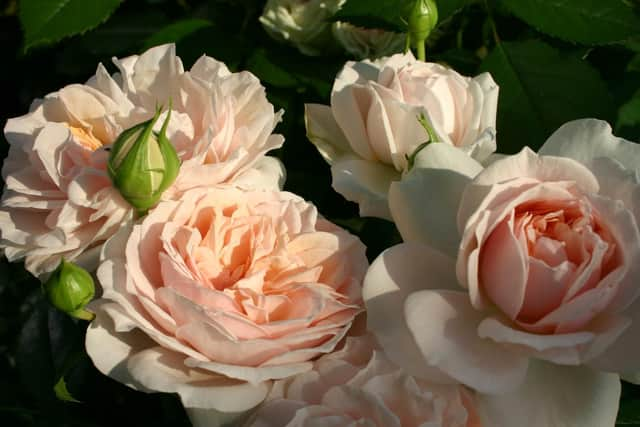Feel Good: Tips for a fragrant, scented and sensory garden
and live on Freeview channel 276
They can help to reduce stress and anxiety be providing a place to escape to and take time out – and the power of scent can affect your mood, appetite and concentration.
When you select your garden plants for smell, make sure you choose some for the different ways they release their scent.
Advertisement
Hide AdAdvertisement
Hide AdFor fragrance that fills the air and can be smelt without touching the plant Jasmine is a great option and its sweet aroma can help to alleviate stress and anxiety.


Jasmines are evergreen or deciduous climbers with twining stems and they can be summer or winter flowering with an abundance of white or yellow flowers.
They need to be planted somewhere sunny and warm close to a wall or fence, and preferably near a seating area so you can enjoy the scent of the flowers.
A classic choice of plant that you will need to get a little closer to to smell its fragrance is a rose.
Advertisement
Hide AdAdvertisement
Hide AdRoses put on a fantastic show throughout the summer months with a wonderful flush of flowers.
English roses tend to be the most highly scented and grow well in gardens of all sizes as well as in containers.
Best in sunny spots, roses have traditionally been used to calm and uplift the spirit.
Plants you need to get up close and personal with – ones you have to pinch or rub with with your fingers – tend to have scented oils in their leaves that release their fragrance when touched, such as scented geraniums or lavender.
Advertisement
Hide AdAdvertisement
Hide AdEssentially a herb, lavender was historically used for its healing properties and its fragrance can help the body unwind and relax, especially at night time.
It’s an easy grower – in gardens and in pots – and likes the sun.
There are some plants that give off scent when crushed under foot such as chamomile.
Its feathery green leaves are highly fragrant when crushed and it has a profusion of white daisy like flowers used to make chamomile tea that helps to calm and relax.
Advertisement
Hide AdAdvertisement
Hide AdChamomile grows best in partial shade and, like most herbs, needs very little care once its established.
It’s often recommended as a companion plant for vegetable gardens as its strong scent tends to keep pests away.
Smell is the strongest of the senses, linked directly to emotion, so the aroma of a particular plant can transport you back in time to a distant memory – making scented gardens ideal for anyone living with memory issues.
But, it’s not just memory that benefits from a bit of garden time, our general wellbeing is intrinsically linked to the natural world.
Advertisement
Hide AdAdvertisement
Hide AdThrive – the gardening for health charity – has just developed a free resource to help people keep well - especially during periods of isolation.
Delivered straight to your email box, the Thrive Gardening Club offers fortnightly tips to get the most out of your own garden.
It also includes activities for children, tips to help you garden if you have a disability or long-term health condition and plenty of information about how gardening can keep you healthy and feeling well.
And if you don’t have your own garden to enjoy, Thrive shows you ways you can still access the benefits of connecting with nature.